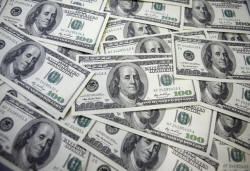|
The
dollar was flat against the yen, having hit a 17-month low
against the yen on Thursday, with traders worried that a sharp
rise in the Japanese currency would elicit some kind of
intervention from the Bank of Japan.
The dollar was trading at 111.25 yen, off a low of 110.67
plumbed on Thursday that was its weakest since October, 2014.
The euro retreated from a five-week high of $1.1342, but was
still on track to gain 1.2 percent on the week.
All this saw the dollar index trade 0.25 percent higher at
95.001, having fallen to a five-month trough of 94.578 in Asian
trade. It was set to end the week 1.2 percent lower.
"At these levels, the market is nervous about pushing dollar/yen
too far lower just in case there is some response from the BOJ,"
said Yujiro Goto, currency strategist at Nomura.
The dollar has slid sharply since the Federal Reserve lowered
its expectations for interest rate increases this year at the
midweek Federal Open Market Committee (FOMC) meeting. Treasury
yields have dropped sharply since the policy meeting, fuelling
the dollar's fall.
"Short-term speculators are leading the action. They appear to
be selling the dollar and Japanese stocks in tandem, trying to
probe for a bottom," said Kaneo Ogino, director at foreign
exchange research firm Global-info Co in Tokyo.
"They are testing to see if the trough of the recent 110-115 yen
range can hold," he said.
The dollar's post-FOMC weakness against the yen presents a
headache for Japan. The country would like to see the yen remain
relatively weak to support its exporters, but the market thinks
Japan has to tread carefully lest it is accused of engineering
competitive devaluations.
The dollar's weakness poses a challenge to the European Central
Bank, too. The ECB eased extensively last week, hoping to weaken
the euro somewhat and boost inflation.
But some banks are already revising their euro/dollar forecasts
higher. Dutch bank ABN-Amro on Friday said it expected the euro
to trade around $1.15 in the foreseeable future with a further
adjustment in Fed rate hike expectations likely to see the euro
touch $1.20.
"The longer-term picture has changed for the dollar," said
Georgette Boele, analyst at ABN Amro. "We think the multi-year
bull trend of the dollar has come to an end. So if the range in
euro/dollar is broken, it will likely be on the dollar weakness
side, in our view."
(additional reporting by Shinichi Saoshiro; Editing by)
[© 2016 Thomson Reuters. All rights
reserved.] Copyright 2016 Reuters. All rights reserved. This material may not be published,
broadcast, rewritten or redistributed. |
|





